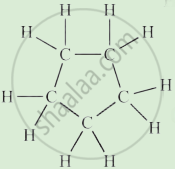Advertisements
Advertisements
प्रश्न
List three characteristic properties of covalent compounds.
उत्तर
The characteristic properties of covalent compounds are as follows:-
(i) They have low melting and boiling points.
(ii) They do not conduct electricity.
(iii) They are not soluble in water, but they dissolve readily in organic solvents.
संबंधित प्रश्न
Explain why carbon forms compounds mainly by covalent bond.
State the reason to explain why covalent compounds "are bad conductors of electricity".
State whether the following statement is true or false:
Diamond and graphite are the covalent compounds of carbon element (C)
What type of chemical bond is formed between carbon and bromine?
Friedrich Wohler converted an inorganic compound into an organic compound in the laboratory.
Write the name and formula of organic compound formed.
Explain why, diamond is hard while graphite is soft (though both are made of carbon atoms).
Explain why, diamond has a high melting point.
What is graphite?
The number of covalent bonds in pentane (molecular formula C5H12) is:
One of the following contains a double bond as well as single bonds. This is:
(a) CO2
(b) O2
(c) C2H4
(d) C2H2
Give the formulae of the chlorides of the elements X and Y having atomic numbers of 3 and 6 respectively. Will the properties of the two chlorides be similar or different? Explain your answer.
Give the characteristic properties of covalent compounds.
Complete the following:
When the nuclei of two different reacting atoms are of ______ mass, then a bond so formed is called ______ covalent bond. (equal, unequal, polar, non-polar)
Give two example in following case:
Gaseous polar compounds
Choose and write the correct option.
Which type of carbon-carbon bonds are present in Vanaspati ghee?
Which of the following is a common characteristic of a covalent compound?
Electrons are getting added to an element Y:
Is Y getting oxidised or reduced?
Complete the following activity.
Write the names of the hydrocarbons for the following structural formula.
(isobutylene, cyclohexane, propene, cyclohexene, cyclopentane, benzene, propyne, isobutane, propane)
 |
A molecule of ammonia (NH3) has
Molecular reactions are ______ in the covalent compound.
